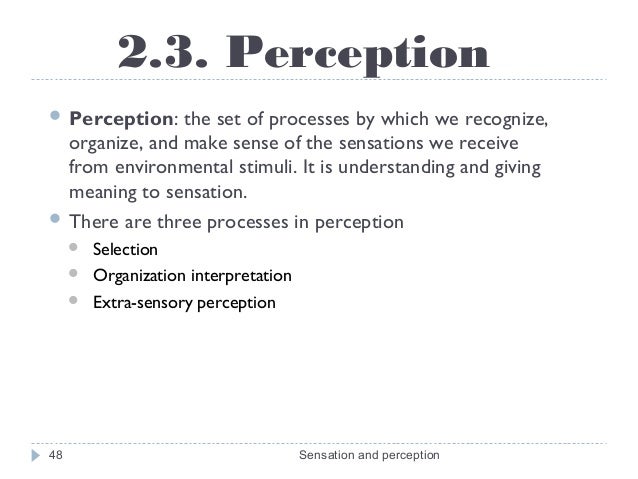Perception Definition

Read this article to learn about the meaning, nature and importance of perception.
Meaning and Definition of Perception:
“Perception is the process through which the information from outside environment is selected, received, organised and interpreted to make it meaningful to you. This input of meaningful information results in decisions and actions.”
A few definitions of perception as given by different authors are as explained below:
ADVERTISEMENTS:
Perception, in humans, the process whereby sensory stimulation is translated into organized experience. That experience, or percept, is the joint product of the stimulation and of the process itself. Relations found between various types of stimulation (e.g., light waves and sound waves) and their.

“Perception may be defined as a process by which individuals organize and interpret their sensory impressions in order to give meaning to their environment.”
According to Joseph Reitz, “Perception includes all those processes by which an individual receives information about his environment—seeing, hearing, feeling, tasting and smelling. The study of these perpetual processes shows that their functioning is affected by three classes of variables—the objects or events being perceived, the environment in which perception occurs and the individual doing the perceiving.”
In simple words we can say that perception is the act of seeing what is there to be seen. But what is seen is influenced by the perceiver, the object and its environment. The meaning of perception emphasises all these three points.
Nature of Perception:
Perception has been explained by Ajit Singh as follows:
“Perception refers to the interpretation of sensory data. In other words, sensation involves detecting the presence of a stimulus whereas perception involves understanding what the stimulus means. For example, when we see something, the visual stimulus is the light energy reflected from the external world and the eye becomes the sensor. This visual image of the external thing becomes perception when it is interpreted in the visual cortex of the brain. Thus, visual perception refers to interpreting the image of the external world projected on the retina of the eye and constructing a model of the three dimensional world.”
Beamng drive. From the above explanation it becomes clear that perception is something more than sensation. It correlates, integrates and comprehends diverse sensations and information from many organs of the body by means of which a person identifies things and objects, the sensations refer to.
Perception is determined by both physiological and psychological characteristics of the human being whereas sensation is conceived with only the physiological features. Thus, perception is not just what one sees with the eyes it is a much more complex process by which an individual selectively absorbs or assimilates the stimuli in the environment, cognitively organizes the perceived information in a specific fashion and then interprets the information to make an assessment about what is going on in one’s environment.
Perception is a subjective process, therefore, different people may perceive the same environment differently based on what particular aspects of the situation they choose to selectively absorb, how they organize this information and the manner in which they interpret it to obtain a grasp of the situation.
Importance of Perception:
ADVERTISEMENTS:
(i) Perception is very important in understanding the human behaviour, because every person perceives the world and approaches the life problems differently- Whatever we see or feel is not necessarily the same as it really is. It is because what we hear is not what is really said, but what we perceive as being said. When we buy something, it is not because it is the best, but because we take it to be the best. Thus, it is because of perception, we can find out why one individual finds a job satisfying while another one may not be satisfied with it.
(ii) If people behave on the basis of their perception, we can predict their behaviour in the changed circumstances by understanding their present perception of the environment. One person may be viewing the facts in one way which may be different from the facts as seen by another viewer.
(iii) With the help of perception, the needs of various people can be determined, because people’s perception is influenced by their needs. Like the mirrors at an amusement park, they distort the world in relation to their tensions.
(iv) Perception is very important for the manager who wants to avoid making errors when dealing with people and events in the work setting. This problem is made more complicated by the fact that different people perceive the same situation differently. In order to deal with the subordinates effectively, the managers must understand their perceptions properly.
Thus, for understanding the human behaviour, it is very important to understand their perception, that is, how they perceive the different situations. People’s behaviour is based on their perceptions of what reality is, not on reality itself. The world as it is perceived is the world that is important for understanding the human behaviour.
Related Articles:
The study, of these perceptual processes, shows that their functioning is affected by three classes of variables – the objects or events being perceived, the environment in which perception occurs, and the individual doing the perceiving. What is PerceptionPerception depends on complex functions of the nervous system but subjectively seems mostly effortless because this processing happens outside of conscious awareness.According to Joseph Reitz; “Perception includes all those processes by which an individual receives information about his environment—seeing, hearing, feeling, tasting and smelling.”According to B. Gilmer, “Perception is the process of becoming aware of situations, of adding meaningful associations to sensations.”Uday Pareek said perception can be defined as “the process of receiving, selecting, organizing, interpreting, checking, and reacting to sensory stimuli or data.”According to S.
Robbins, perception can be defined as “the process by which individuals organize and interpret their sensory impressions in order to give meaning to their environments.”Perception includes the 5 senses; touch, sight, taste smell and sound.